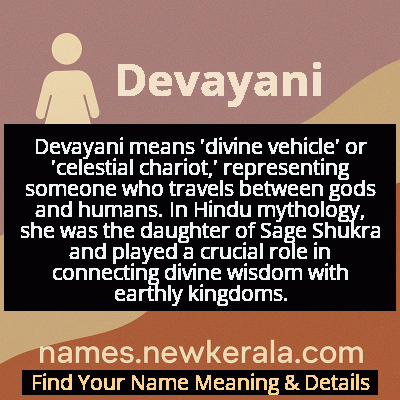Devayani Name Meaning & Details
Origin, Popularity, Numerology Analysis & Name Meaning of Devayani
Discover the origin, meaning, and cultural significance of the name DEVAYANI. Delve into its historical roots and explore the lasting impact it has had on communities and traditions.
Name
Devayani
Gender
Female
Origin
Hindu
Lucky Number
9
Meaning of the Name - Devayani
Devayani means 'divine vehicle' or 'celestial chariot,' representing someone who travels between gods and humans. In Hindu mythology, she was the daughter of Sage Shukra and played a crucial role in connecting divine wisdom with earthly kingdoms.
Devayani - Complete Numerology Analysis
Your Numerology Number
Based on Pythagorean Numerology System
Ruling Planet
Mars
Positive Nature
Generous, passionate, energetic, and humanitarian.
Negative Traits
Impulsive, impatient, moody, and can be overly emotional.
Lucky Colours
Red, maroon, scarlet.
Lucky Days
Tuesday.
Lucky Stones
Red coral, garnet.
Harmony Numbers
1, 2, 3, 6.
Best Suited Professions
Military, sports, philanthropy, leadership roles.
What People Like About You
Courage, energy, leadership, generosity.
Famous People Named Devayani
Devayani (Mythological)
Mythological Princess
Daughter of Sage Shukra, wife of King Yayati, central figure in Mahabharata lineage
Devayani (Classical Dancer)
Bharatanatyam Dancer
Renowned classical dancer and choreographer preserving traditional Indian dance forms
Devayani (Academic)
Sanskrit Scholar
Professor of ancient Indian literature and mythology at prominent university
Name Variations & International Equivalents
Click on blue names to explore their detailed meanings. Gray names with will be available soon.
Cultural & Historical Significance
Her narrative explores themes of pride, love, rejection, and royal lineage. The story of her romance with Kacha, her marriage to Yayati, and her complex relationships with her father and rival Sharmishtha provide rich cultural lessons about dharma, social hierarchy, and the consequences of actions. Devayani's character embodies both aristocratic pride and emotional vulnerability, making her one of the more nuanced female characters in ancient Indian literature.
Extended Personality Analysis
Women named Devayani are often perceived as possessing a regal and intellectual demeanor, reflecting their mythological namesake's heritage as the daughter of the great sage Shukra. They tend to exhibit strong willpower, intelligence, and a natural leadership quality, combined with a deep sense of tradition and cultural awareness. Their personality often blends analytical thinking with emotional depth, making them both practical and intuitive in their approach to life's challenges.
These individuals typically demonstrate resilience and determination when faced with obstacles, much like the mythological Devayani who navigated complex relationships and societal expectations. They often possess a certain aristocratic elegance and pride in their heritage, yet maintain a compassionate nature toward those they care about. Their combination of intellectual prowess and emotional intelligence allows them to excel in roles requiring both analytical thinking and interpersonal skills.
Modern Usage & Popularity
Devayani remains a cherished name in Hindu families, particularly among those with strong cultural and mythological connections. While not among the most popular contemporary names, it maintains steady usage among educated, urban families who appreciate its classical roots and sophisticated sound. The name is especially favored in South Indian states and among Brahmin communities where mythological names hold significant value. In recent years, there's been a mild resurgence of interest in such classical names as parents seek unique yet meaningful alternatives to more common modern names.
Symbolic & Spiritual Meanings
Symbolically, Devayani represents the connection between celestial and earthly realms, embodying the idea of divine knowledge descending to humanity. The name signifies a bridge between wisdom and worldly existence, reflecting her position as daughter of the guru of demons who married a mortal king. It also symbolizes aristocratic pride, intellectual heritage, and the transmission of sacred knowledge across generations. The name carries connotations of royal lineage, spiritual authority, and the complex interplay between destiny and personal choice.

